#the seeger sessions band
Explore tagged Tumblr posts
Text
youtube
Bruce Springsteen Re-releases “We Shall Overcome” to Mark MLK Day in United States
- Seeger Sessions Band performance hails from 2006 New Orleans Jazz & Heritage festival
Bruce Springsteen re-released his 2006 performance of “We Shall Overcome” to mark Martin Luther King Day in the United States.
Backed by the Seeger Sessions Band at the 2006 New Orleans Jazz & Heritage festival, Springsteen wrote an all-American arrangement featuring acoustic and pedal-steel guitars; brass; dual violins; upright bass and light percussion; and a chorus of male and female backgrounds to create a celebratory version of the often-a capella song of somber perseverance.
It’s a slow build, from Springsteen solo to full-band participation that seems a deliberate message within a message. For anyone who missed the point, Springsteen elaborated.
“There’s the beautiful quote by Dr. King that says the arc of the moral universe is long, but it bends toward justice,” he said in a statement.
“I’ve lived long enough to see that in action and to put some faith in it. I’ve also lived long enough to know that arc doesn’t bend on its own. It needs all of us leaning on it, nudging it in the right direction day after day.”
1/16/24
#Youtube#bruce springsteen#the seeger sessions band#pete seeger#we shall overcome#martin luther king day#new orleans jazz & heritage festival
4 notes
·
View notes
Text
Bruce Springsteen & The Seeger's Sessions Band
The Daring Young Man on the Flying Trapeze
(26-04-2006 Convention Hall, Asbury Park)
youtube
#The Daring Young Man on the Flying Trapeze#bruce springsteen#seeger's sessions band#musica#folk music#musica folk#folk#Youtube
2 notes
·
View notes
Text

2 notes
·
View notes
Text
#everything you need to know about rock
David Gilmour. (part 1)
Wild Jokers: A Career before Pink Floyd
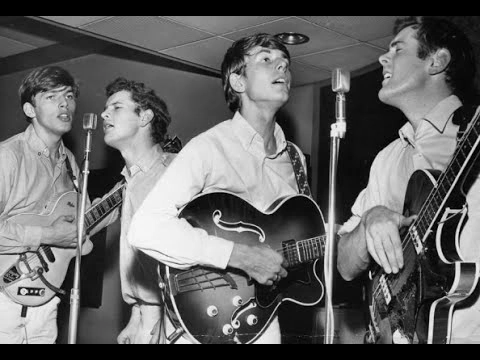
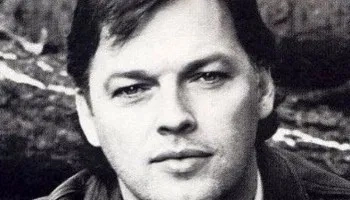
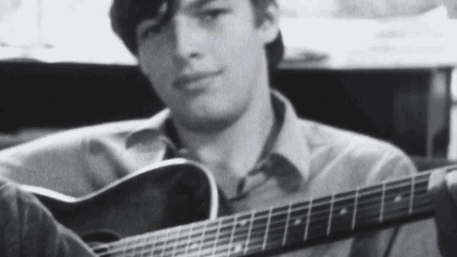
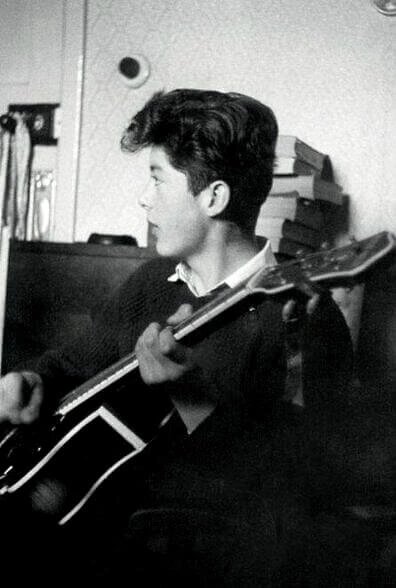

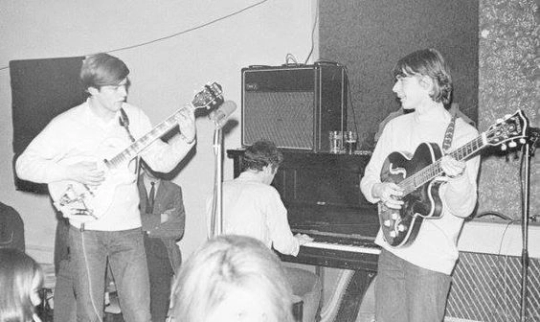
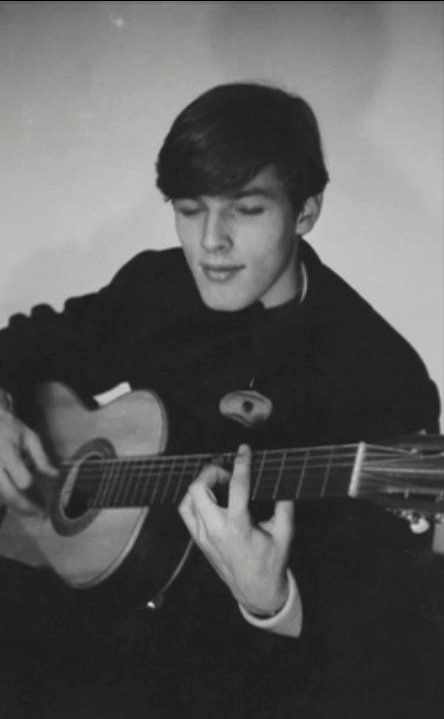
David Jon Gilmour was born on March 6, 1946 in Cambridge, England. His parents encouraged his interest in music and in '54 he acquired the single 'Rock Around the Clock' by Bill Haley [Bill Haley and The Comets].
David: "I'm not sure if 'Rock Around the Clock' was the first record I bought, but it was definitely one of the first."
'Heartbreak Hotel' and 'Jailhouse Rock' Elvis [Elvis Presley] and 'Bye Bye Love' The Everly Brothers drew his attention to the guitar.
David: "I liked the Everleys. When I was 13, I borrowed a Tatay Spanish guitar with nylon strings from a guy next door. They gave it to him, but he had no hearing, and he didn't need it. I never got it back." I started playing, and my parents were delighted. We had a musical family — my parents sang, my brother played the flute and my sister played the violin. They bought me a Pete Seeger Teaches Guitar tutorial with a set of records for it."
Rado Bob Klose, future member of The Tea Set, an early incarnation of Pink Floyd]:
"We listened to Radio Luxembourg. Let's hear a song and think, 'How do I play it?'. I remember David playing 'Walk Don't Run' The Ventures, as soon as I heard it."
David also liked Leadbelly], Sony Terry], Brownie McGhee], Howlin' Wolf], Hank Marvin, lead guitarist of The Shadows], and later, he discovered Bob Dylan], whose record his parents brought from America.
David: "I was interested in a wide range — from blues to folk and pop music. Hank Marvin with elements of Dylan Leonard Cohen] and Leonard Bernstein]. Also Pete Seeger and Woody Guthrie]."
At the age of 11, David met Roger 'Syd' Barrett, the future guitarist/vocalist of Pink Floyd and Roger Waters, the future bassist/vocalist of Pink Floyd, who went to school next door.
Rosemary Breen, Sid's sister]: "In '61, Clive Welham, the future drummer of Jokers Wild] brought Gilmore to a jam session at Sid's house. They played 'Twenty Flight Rock' Eddie Cochran] and immediately became friends. David came to us often, he and his brother had a lot in common. He was quiet, shy, laconic, but very charming."
In '63, he began studying modern languages at the College of Arts and Technology. He did not complete the course, but learned to speak French fluently. He and Barrett, who studied there, played guitars and harmonicas between lectures.
David: "We played Bo Diddley and 'Come On' The Rolling Stones, The Beatles songs, various blues. We could also play The Shadows instrumentals like 'Apache' for hours."
Stephen Pyle, Gilmore's classmate]: "I've never seen him without a guitar."
At the end of '62, Gilmore became a member of the local band The Ramblers, which included John Gordon, rhythm guitarist] and Clive Welham.
Clive: "We were a semi-professional band, but David was just amazing. A year before that, he didn't play so well, but he worked a lot on technique."
Rick Wills, bassist, future member of Jokers Wild; later worked with Peter Frampton], Roxy Music, Small Faces, David Gilmour, Foreigner and Bad Company, Lynyrd Skynyrd, The Jones Gang, etc.:
"I often met Dave at the music store. Sometimes we wouldn't leave without playing all the guitars that were there. But Dave sometimes seemed arrogant to me. He had this expression on his face: 'I know everything.'"
At the same time, Gilmore was performing with another local band, The Newcomers (July -October '63).
Ken Waterson, vocalist of The Newcomers:
"David had a beat—up Burns guitar and a lousy amp, but even then one thing was clear - he was good."
Gilmore's next band was Jokers Wild * in '64 with Dave Altham vocalist, keyboardist, guitarist and saxophonist], John 'Willie' Wilson, drummer, later worked with Syd Barrett, Al Stewart], Cochise, Quiver, the Sutherland Brothers, David Gilmore, Pink Floyd, etc], Tony Sainty, bassist], who was sometimes replaced by either Rick Wills or David's brother, Peter Gilmour].
Dave Oltham: "We were told about this guy, and we went to see him in a pub on Newmarket Road. The band was about nothing at all, but he played well. I would say emphatically. We asked him to play with us and he agreed."
Their strong point was the vocal harmonies of all five members.
David: "We were quite popular because we played modern dance music, which is what people wanted to hear back then."
Clive: "Wilson Pickett's hit] 'The Midnight Hour' ('65) was his best vocal number and David played a brilliant solo in it on his fiery Hofner Club 60 flame timber] The girls were delighted."
Dave Oltham: "David could listen to a song four or five times and then play it, note by note."
In August '65, Gilmore and Barrett played 'You've Got To Hide Your Love Away' and 'Help' The Beatles on acoustic guitars on the streets of Saint Tropez.
David: "I hitchhiked to the south of France, and Sid came with a friend ** in his Land Rover. I joined them at the campsite where they lived. I remember we went to play in Saint Tropez one day, for fun, and we were arrested for playing without permission. They were released on the promise to get out of the city immediately. We had a great time."
Around the same time, both Gilmore and Barrett, in Cambridge, first tried LSD, hashish and 'magic' mushrooms. David hadn't even smoked marijuana before.
David: "It was a very deep experience."
There was not enough money and Gilmore then took on any job; he delivered wine, sold hot dogs, shipped sheet iron and even worked a couple of times as a model for Varsity magazine.
John Gordon: "Dave always looked more sophisticated than Sid [Barrett]. He looked like a college student from America; white Levi's and all that. The girls liked him."
Christine Smith, at that time a 17-year-old fan of Jokers Wild]: "All the girls were crazy about him. We called him Adonis." ***
In '65, Jokers Wild self-financed the recording of their only album and single 'Don't Ask Me (What I Say)'/'Why Do Fools Fall in Love'. 50 copies of the single and 50 copies of the album were printed. ****
David: "We recorded covers from our live set."
1. Why Do Fools Fall in Love (Frankie Lymon/Herman Santiago/ Jimmy Merchant) 1:51 (hit by American band Frankie Lymon & the Teenagers '56; cover based on the Beach Boys'64 version)
2. Walk Like a Man (Bob Crewe/Bob Gaudio) 2:14 (hit by the American band The Four Seasons '63)
3. Don't Ask Me (What I Say) (Paul Jones) 2:55 (song from the album by the British band Manfred Mann 'The Five Faces of Manfred Mann' '64)
4. Big Girls Don't Cry (Bob Crewe/Bob Gaudio) 2:19 (hit The Four Seasons '62)
5. Beautiful Delilah (Chuck Berry) 2:03 (Chuck Berry song '58; cover based on The Kinks'64 version)
"It was an act of vanity. We went to London and recorded 5 songs at the Regent Sound Studio on Denmark Street, without having the slightest idea what we were doing. We had fans in Cambridge and then we sold them to them. I still have a master tape lying around somewhere."
The band's popularity on the local scene grew, they opened concerts by Animals and Zoot Money's Big Roll Band, The Paramounts (an early incarnation of Procol Harum, performed and jammed with Paul Simon and The Tea Set, later known as Pink Floyd. Some sources claim that at some stage Dick Parry also played in the band [Dick Parry, saxophonist who later worked with Pink Floyd, The Who, Quiver, Paice Ashton Lord, David Gilmore, etc.)
To be continued...



From books: Comfortably Numb the Inside Story of Pink Floyd by Mark Blake, Da Capo Press, 2008; Pink Floyd: The Early Years by Barry Miles, Omnibus Press, 2011 interviews with Gilmore, Oltham, Brin and Wills]
#everything you need to know about rock#pink floyd#David Gilmour#syd barrett#roger waters#music#my music#music love#musica#history music#spotify#rock music#rock#rock photography#my spotify#Spotify#jokers wild#Jokers Wild (band)
24 notes
·
View notes
Text
I feel like I may have already told this story here at some point, but for a good several years of my childhood the only Bruce Springsteen album I had ever listened to was The Seeger Sessions, which I absolutely loved. I was, however, not aware that Bruce Springsteen was not actually a big-band folk singer and that the vast body of work which he is known for is not whatever he's doing on that album. I fully thought this was what he was famous for, and so when he played at the halftime show at the Super Bowl I was really surprised but really excited. He came on and I was so ready for him to begin belting out "John Henry" or "Oh Mary Don't You Weep", and I cannot even begin to express how perplexed I was when he began singing Normal Pop Songs. Truly this was one of the biggest betrayals in history. Also I've still never actually listened to anything else by him, although at this point I'm beginning to think he would be alright with that being his legacy for one weird kid from Boston.
#listening to the seeger sessions and being reminded of this#side note: it's a really good album you should all listen to it if you like that sort of thing#perce rambles
11 notes
·
View notes
Note
Bill Monroe challenges Mcgucket to a dueling banjo session. Who wins?
XD Here goes an unnecessarily detailed answer, as one might expect from me.
Father of Bluegrass Bill Monroe (1911-1996) was a virtuosic mandolinist (also no slouch on guitar) who incorporated fiddling influences into his playing. Rather than an old-style shimmering tremelo, Bill Monroe attacked the strings in an impressive combination of rhythmic adroitness and dogged melody. His playing had rhythmic quirks bluegrass mandolinists tease on today, but I think it augments rather than detracts from his iconic sound.
Historically speaking, Monroe stepped the game up for virtuosity in American country music. Even when he was in his twenties, performing duos and trios with his brothers on the radio in a more old-time style, his technical alacrity caught attention. Monroe fashioned bluegrass with blues and even jazz influences, such as the idea of instrumentalists taking turns doing technical instrumental breaks, one after the other. Thus, not only did he have to be at a high standard, but he pushed everyone in his band to match it. This man regularly performed hundreds of songs at a whim with good ear and improv ability.
Now, Fidds, my beloved... how does he compare? We hear relatively little of Fiddleford McGucket's banjo picking in Gravity Falls. What information we could glean is contradictory due to animation and sound design inaccuracy. I apologize for upcoming jargon, but I'll explain. ;)
McGucket owns multiple banjos. All banjos he's owned lack planetary tuners, which tends to indicate a low-cost banjo beginners and non-serious players use. However, given as McGucket has dedicatedly played banjo since at least the 1970s, and is dedicated enough to own a collection, this suggests a more invested player. (Of course, you can play for years and be passionate and still suck, but there's a higher chance you're good, hah!) Looking at the meta context, the animators would have no idea they were connotating lower-end instruments, so let's go with writing intent: McGucket is the banjo guy playing with love and passion for decades.
McGucket is most often seen with open-backs, but also has had a Seeger (long-neck) banjo and a resonator. Open-back and Seeger banjos suggest McGucket plays in the old-time style, which is (often) based on repeated rhythms and chords. That we've never seen Fiddleford McGucket wear finger picks also matches old-time. Now, I love old-time, it's gorgeous. But. Old-time banjo doesn't... shred... so in a dueling session, this would be trumped by Monroe's more advanced approach.
On the other hand, McGucket has a resonator. Resonator banjos can and have been used for old-time styles, but in general: if you have a resonator, you're a three-finger style bluegrass picker. This is a very different technique than old-time and will start to put McGucket in the competition. It's also said in Journal 3 he loves listening to high-intensity bluegrass, and when we hear sound clips of McGucket playing, it's in the three-finger bluegrass style. They animate him wrong to be making those sounds, but those are the sounds they're evoking. So, given animation is always inaccurate depicting instruments and performance, bluegrass is the genre associated most directly with McGucket, the animators and maybe even composer might've had no knowledge of old-time and its sounds, and the soundtrack always evokes bluegrass-style banjo... the Gravity Falls team probably wanted to indicate McGucket played bluegrass-style banjo.
I'm not on a computer with speakers to listen to McGucket playing, but I distinctly remember A Tale of Two Stans. I can and have played that riff. I'll transcribe (more or less) it by memory rn.
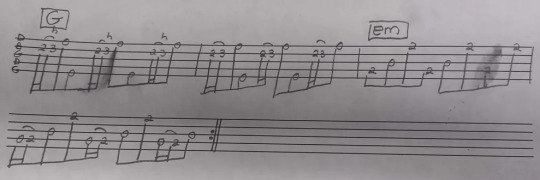
McGucket is approximately playing the first few measures of Foggy Mountain Breakdown with the barcodes pulled off. He starts with the Foggy Mountain roll on a G chord, then descends to do a forward roll on an e minor chord. Without jargon, this means he's playing two very simple right hand patterns. These patterns are ones a baby banjo picker would learn in their first month playing.
And that's exactly what happened when you know how the soundtrack developed! Gravity Falls' composer learned some banjo for GF. He's doing what I would... learn baby-baby basics so you can record an instrument live. But this means that, because he learned juuuust enough to get the banjo sound in GF (S1 banjo sounds worse than S2 because of this learning curve, too), he can't depict McGucket as a skilled picker. He does an impressive job with the above measures given his inexperience (the tone is better than I'd expect), but the material itself is rudimentary.
Contrast this with Bill Monroe in one of his beloved instrumentals, Southern Flavor (he is the mandolinist who starts the song, first soloist):
youtube
Given what Gravity Falls put in the show, McGucket wouldn't stand a chance against Monroe. McGucket wouldn't get hired by Monroe. Obviously we have to do legwork to go beyond imperfect depictions - the limited knowledge and playing ability of animators and composer - so it's very fair to say McGucket is better than anything presented. But, even then, he's got zero shot competing against a professional who expanded virtuosity of a music style and forced musicians around him to get up to his level. Bluegrass had come into its own and many, many, many amateur players were playing breathtakingly by the 1960s and 1970s. But you ain't gonna beat the master who got 'em all there.
#I WROTE A REALLY STUPID WRONG NOTE IN THE TRANSCRIPTION BUT SHHHHHHHH NO ONE NOTICES#bluegrass#Gravity Falls#GF#long post#music#music analysis#analysis#my analysis#ask#ask me#Fiddleford McGucket#I swear I didn't say everything I thought on this matter either re: music#jayalaw#non-dragons#also: I have another music ask that I've been meaning to post since the day I got it#I'll try to finish it later today#if I'm still awake by the time work ends#shhhhhhh I didn't <.< and this <.< during work#what style McGucket plays is open to fandom interpretation therefore XD#I've seen some people headcanon him as an old-time player or both old-time and Scruggs-style
8 notes
·
View notes
Text
happy birthday Bruce Springsteen
Bruce Frederick Joseph Springsteen (born September 23, 1949) is an American rocksinger, songwriter, and guitarist. Nicknamed "the Boss", he has released 21 studio albums during a career spanning six decades, most of which feature his backing band, the E Street Band. Springsteen is a pioneer of heartland rock, combining a commercially successful rock sound with poetic and socially conscious lyrics reflecting the issues of working class American life. He is known for his descriptive lyrics and energetic concerts, which sometimes last over four hours
Springsteen released his first two albums, Greetings from Asbury Park, N.J. and The Wild, the Innocent & the E Street Shuffle, in 1973. Although both were well received by critics, neither earned him a large audience. He changed his style and achieved worldwide popularity with Born to Run (1975), followed by Darkness on the Edge of Town (1978) and The River (1980), Springsteen's first album to top the Billboard 200 chart. After the solo effort Nebraska (1982), he recorded Born in the U.S.A. (1984) with the E Street Band, which became his most commercially successful album and the 23rd-best selling album of all time as of 2024. All seven singles from Born in the U.S.A. reached the Top 10 of the BillboardHot 100, including the title track. Springsteen mostly hired session musicians for the recording of his next three albums, Tunnel of Love (1987), Human Touch (1992), and Lucky Town (1992). He reassembled the E Street Band for Greatest Hits (1995), and recorded the acoustic album The Ghost of Tom Joad(1995) and the EP Blood Brothers (1996) solo.
Springsteen dedicated The Rising (2002) to the victims of the September 11 attacks. He released two more folk albums, Devils & Dust(2005) and We Shall Overcome: The Seeger Sessions (2006), followed by two more albums with the E Street Band, Magic (2007) and Working on a Dream (2009). The next albums, Wrecking Ball (2012) and High Hopes (2014), topped album charts worldwide. In 2017, 2018 and 2021, Springsteen performed the critically acclaimed show Springsteen on Broadway, in which he performed songs and told stories from his 2016 autobiography; an album versionfrom the Broadway performances was released in 2018. He released the solo Western Stars (2019), Letter to You (2020) with the E Street Band, and a solo covers album Only the Strong Survive (2022). Letter to You reached No. 2 in the US, making Springsteen the first artist to release a top-five album across six consecutive decades.
One of the album era's most prominent musicians, Springsteen has sold more than 71 million albums in the U.S. and over 140 million worldwide, making him the 27th best-selling music artist of all time as of 2024. His accolades include 20 Grammy Awards, two Golden Globes, an Academy Award, and a Special Tony Award. He was inducted into the Songwriters Hall of Fame and the Rock and Roll Hall of Fame in 1999, received the Kennedy Center Honors in 2009, was named MusiCares person of the year in 2013, and was awarded the Presidential Medal of Freedom in 2016 and the National Medal of Arts in 2023. In 2010, Rolling Stone ranked Springsteen 23rd on its list of the "100 Greatest Artists of All Time", describing him as "the embodiment of rock and roll".
Favorite song/album?
1 note
·
View note
Text
my small used bookstore haul because I am rediscovering how wonderful physical media is:

- Cats Ultimate Edition on DVD. this is a 2001 Canadian release of the 1998 production. I can't wait to watch it, I've never seen Cats
- Brian Wilson Presents Smile on CD. released in 2004. if you don't know the story of this album, I recommend looking it up because it's fascinating. Smile was the unreleased follow-up to Pet Sounds. many years later, Brian re-recorded and completed Smile. the original Smile Sessions were also released on CD, but this is Brian's 'official' version.
- Back In the Swing by Anthony Warlow on CD. not a lot of people in the US know who he is. I found him on a Les Mis cast recording and never forgot him. I wanted to buy one of his albums years ago but they cost a fortune to ship from Australia. a decade later, I got this from the clearance rack for 3 bucks.
- Eureka Seven Complete Best on CD. it's opening and ending songs from the air surfing mecha anime that time forgot. some of this shit slaps, and it was also on the clearance rack for 3 bucks. Shonen Heart is great, go listen to it.
- Bruce Springsteen: We Shall Overcome (the Seeger Sessions) on CD. Bruce and a band of folk musicians play the songs of Pete Seeger. recorded live and unrehearsed over three days. you can hear Bruce calling out instructions and arrangements live and on the spot. fucking cool as shit, highly recommended if you're a musician of any kind. this is why he's The Boss.
3 notes
·
View notes
Text
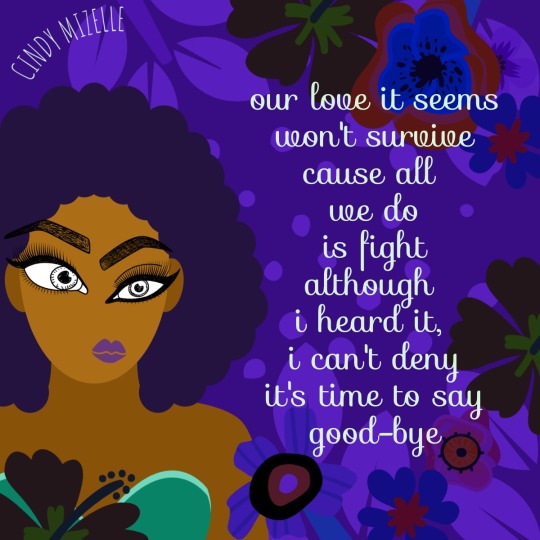
"I have mad respect for athletes and have penned a few songs with more to give all the way around," says my friend, singer, and songwriter Cindy Mizelle.
Cindy Mizelle is the proud mother of three children. Her two sons are professional athletes. Devin Fuller, a wide receiver with the Atlanta Falcons, and Jordan Fuller, a safety for the Carolina Panthers, have had distinguished careers in the NFL.
Her incredible career includes Bruce Springsteen and the E Street Band, Seeger Sessions Band, Steely Dan, Billy Ocean, Whitney Houston, Dave Matthews, Duran Duran, Freddie Jackson, Carly Simon, Alicia Keys, and Luther Vandross.
Cindy told Rolling Stone Magazine that growing up, she knew a singing career was in her future, "I just said, "I know how to do this." I played the flute, too, and I knew scales. Everything was a musical thing for me. And once I found that power, I was like, "I'm going!"
I met Cindy on Luther Vandross's Never Let Me Go tour in 1993. Cindy toured and recorded with Luther Vandross for over twenty years. She admits working with Luther felt like family. "I loved everything about him. I could relax and be myself, and he was so supportive. When it came down to my kids, he got them their first shoes."
Between gigs with Luther Vandross and the Rolling Stones, Cindy managed to squeeze the recording of her debut album, Cindy Mizelle, on Atlantic Records. My favorite tracks include the lead single, "I've Had Enough," "Smile, and "Back To Emotions."
Through Cindy, I met the talented performer Katreese Barnes, who was the musical director for SNL and won an Emmy for 'Dick In The Box." I styled Katreese for several shoots and co-produced her show, Rocket Man, featuring the music by Elton John.
A few years later, in 1995, Cindy gave me the gift of a lifetime when she sang lead vocals on the dance song I co-wrote with Keith Haarmeyer, "That Man Of Mine." The fantastic Brenda White-King also performed backing vocals on the record.
I'll always remember the day we recorded the song in Keith's one-bedroom apartment in New York City. After Cindy looked at the lyrics sheet, she asked me if I had a specific idea of how I'd like her to sing the lyrics. Then, to my astonishment, she said the chorus line five or six different ways, varying her tone and phrasing with each variation. It was the most incredible thing I've ever witnessed. I still have goosebumps thinking about it. The power and control she has with her voice are great, too.
I'm not Cindy's only fan, either. In her memoir The Meaning of Mariah Carey, Mariah Carey praises Cindy Mizelle: "To me, she was one of the absolute greatest. "Cindy Mizelle was the background singer. She sang with the most gifted vocalists of all time—Barbra Streisand, Whitney Houston, Luther Vandross, and the Rolling Stones. She was a real singer's singer. Cindy was that girl to me. I looked up to her so much.
It was also a thrill for me to design costumes for The Lovely Ladies (Tawatha Agee, Brenda, and Cindy) when they were on tour with Dave Matthews Band. Most recently, my boyfriend Joe and I filmed Cindy for Nils Lofgren's "Ain't The Truth Enough" music video.
Music is part of her DNA. Cindy Mizelle is the cousin of the famous Mizell Brothers (they dropped the word "e" out of their name), who wrote songs for the Jackson 5 and A Taste of Honey. She's also the cousin of the Ronettes. She told Rolling Stone magazine, "I looked them up and was like, "Oh, my gosh!" That was my motivation there. I'd play their records and figure out what they did. I started singing in the basement and in bands after that."
She mentions how Ronnie Spector always supported her in her career. It's a pleasure to spotlight this remarkable woman whose heart is as big and beautiful as her voice.
1 note
·
View note
Link
https://kevinconneff.bandcamp.com/album/the-pride-of-pimlico
1 note
·
View note
Text
Jon Hammond Show 08 19 2023
Jon Hammond Show 08 19 2023
#WATCHMOVIE HERE: Jon Hammond Show 08 19 2023
Jon's archive https://archive.org/details/jon-hammond-show-08-19-2023
Youtube https://youtu.be/i1GzR_NDNhU
Jon Hammond Show 08 19 2023
by Jon Hammond
Wow, today Willie Chambers told me these words ""Time Has Come Today again!" I was there in the front row 56 years ago when The Chambers Brothers came first time to San Francisco State University San Francisco State Folk Festival March of 1967 - they blew everybody's mind! Peace and Love everybody - I'm very happy to report Willie Chambers is doing great and still performing in So. CA! - Jon Hammond
#thechambersbrothers
#timehascometoday
#time
#SmashHit
The band scored its only major hit in the fall of 1968 with "Time Has Come Today", an 11-minute opus written by Joe and Willie Chambers and highlighted by echoing vocal effects and Keenan's drumming which gave the song a psychedelic feel. "Time Has Come Today" was edited for release as a single and spent five consecutive weeks in September–October at #11 on the Billboard Hot 100, just missing the Top Ten.
Willie Chambers (born March 3, 1938) is a singer, guitarist, and former member of The Chambers Brothers, a rock band in the 1960s with hits "In The Midnight Hour", "I Can't Turn You Loose", and "Time Has Come Today". He continues to be a regular attraction at various venues in Los Angeles and further afield.
Later incarnations of the group included session guitarist Steve Hunter (known for his work with Alice Cooper) An album recorded in 1972 for Columbia, Oh! My God, has remained unreleased until October 28, 2022 when it was finally made available through multiple digital platforms. Although the group disbanded in 1972, they reformed and moved from Columbia to Avco Records and released Unbonded (1974) and Right Move (1975). In 1976 the brothers released Recorded Live In Concert on Mars for the Roxbury label. They have toured irregularly since.
They were signed to support Maria Muldaur on her Gospel Nights album. They also made commercials for Levi's Jeans.
Originally from Carthage, Mississippi,[3] the Chambers Brothers first honed their skills as members of the choir in their Baptist church. This arrangement ended in 1952 when the eldest brother, George, was drafted into the Army. George relocated to Los Angeles after his discharge, and his brothers soon joined him. Beginning in 1954, the foursome played gospel and folk music throughout the Southern California region, but remained little known until 1965 when they began performing in New York City.
Consisting of George (September 26, 1931 – October 12, 2019) on washtub bass (later on bass guitar Danelectro and Gibson Thunderbird), Lester (b. April 13, 1940) on harmonica, and Willie (b. March 3, 1938) and Joe (b. August 22, 1942) on guitar, the group started to venture outside the gospel circuit, playing at coffeehouses that booked folk acts. They played at places like The Ash Grove, a very popular Los Angeles folk club. It became one of their favorite haunts and brought them into contact with Hoyt Axton, Ramblin' Jack Elliott, Reverend Gary Davis, and Barbara Dane.[6] When Dane spotted the brothers there, she knew they would be perfect to do these freedom songs that people wanted to hear then. Dane became a great supporter, performing and recording with the brothers. With the addition of Brian Keenan (January 28, 1943 – October 5, 1985) on drums, Dane took them on tour with her and introduced them to Pete Seeger, who helped put the Chambers Brothers on the bill of the 1965 Newport Folk Festival. One of the songs they performed, "I Got It", appeared on the Newport Folk Festival 1965 compilation LP, which was issued on the Vanguard label.
Lester moved to New York and formed a band with former Electric Flag bassist Harvey Brooks. Guitarists Willie and Joe would find work as session men; George went back to singing gospel music and would later become a deacon of his church. Keenan retired to Stamford, Connecticut where he set up his own recording studio, and died of heart failure in 1985
American Session Drummer, Lee Szymborski, also from Stamford Connecticut, was hired by George Chambers to replace Brian Keenan in 1980, in Los Angeles, CA., and performed live with The Chambers Brothers at the Hollywood Bowl's Fourth Annual Survival Sunday Anti-Nuclear Benefit Concert, with Bruce Springsteen, Jackson Browne, Stephen Stills, Bonnie Raitt, Graham Nash, Gary U.S. Bonds, Peter Yarrow, Kenny Rankin and others in Los Angeles, CA. on June 14, 1981. Lee Szymborski also performed live with The Chambers Brothers and Etta James for two shows at McCabe's Guitar Shop, 3101 Pico Blvd. Santa Monica, CA. July 16, 1981. Lee Szymborski left The Chambers Brothers and joined the critically acclaimed Louisiana Cajun group; "The Savery Brothers" in San Diego, CA.; also playing recording sessions notably with Legendary Country Music Artists Merle Haggard, Doug Kershaw, Johnny Paycheck, Asleep at the Wheel, and Juice Newton. Lee Szymborski currently records and performs in Las Vegas, Nevada.
In 2006, guitarist Willie Chambers sat in with a group called Vince and the Invinceables at a benefit concert for Arthur Lee of the group Love and delivered an acclaimed performance.
In 2015, Joe Chambers was appearing at venues such as Harold's Place on Pacific Ave. San Pedro as The Joe Chambers Experience.[
In 2016, Willie, Joe, and occasionally George, along with their nephew Jerry Warner on bass, Crazy Tomes on guitar, and LA drummer Jon McCracken, reformed as the Chambers Brothers to do shows in the Los Angeles area;[20][21] including the Grammy Museum at L.A. Live.[22]
George Chambers died October 12, 2019, at age 88.
Joe Chambers collaborated with Marva Holiday, recording their version of "To Love Somebody".
Summer of Soul
In 2021 the Chambers Brothers appeared in the Questlove music documentary "Summer of Soul," about the 1969 Harlem Cultural Festival.
Members
In 1970, there was some confusion whether The Chambers Brothers were still with their label, Columbia. The source was an article in the March 28, 1970 issue of Record World. Apparently, singer Judd Hamilton was at a party for an American International Records signing and there was confusion about the Chambers Brothers signing to the label and whether or not Hamilton was a member of the group. The next issue of Record World, (April 4) clarified that The Chambers Brothers were not with the American International label and were still with Columbia Records. It also stated that Hamilton was not a member of The Chambers Brothers.
There was another error, this time by Cashbox magazine, in the April 18 issue. Cliff Chambers who had his own label Cyclone Records and composed “Finders Keepers” and “Somebody Ought to Write a Book” was credited with being a member of The Chambers Brothers while he was signing a contract with Kent Records. The error was picked up and Cashbox wrote in the May 9 issue (Cliff Chambers Not Ex-Chambers) that the group's manager, Charles H. LaMarr said that Cliff Chambers was never a member of the group and that the Chambers' included Joseph Chambers, George Chambers, Willie Chambers and Brian Keenan.
John Castellano joined the band as a guitarist, touring with them during 1971 and 1972. This came about as a result of the brothers finding out that Castellano's mother made the clothes that Jimi Hendrix wore. They headed out to Bath Avenue, in Brooklyn to have the clothes fitted and heard Castellano playing on guitar. Eventually Castellano came on board.
Publication date 2023-08-12Usage Attribution-NonCommercial-NoDerivs 4.0 InternationalTopics Public Access Television, Jon Hammond Show, Music, Travell, News, Photography, Manhattan Neighborhood Network, Hammond Organ, HammondCast, Hammond ReportLanguage English
Jon Hammond Show 08 19 2023 from organist Jon Hammond, Music, Travel, News, Photography - 40th year on Public Access Television - 28 minute program. Manhattan Neighborhood Network MNN - air time: 01:30AM late Friday nights.Addeddate 2023-08-12 12:47:10Color colorIdentifier jon-hammond-show-08-19-2023
Topics Public Access Television, Jon Hammond Show, Music, Travell, News, Photography, Manhattan Neighborhood Network, Hammond Organ, HammondCast, Hammond ReportLanguage English
Topics, Public Access Television, Jon Hammond Show, Music, Travel, News, Photography, Manhattan Neighborhood Network, Hammond Organ, HammondCast, Hammond Report, Language English
Posted 2 minutes ago by HAMMONDCAST
Labels: Hammond OrganHammond ReportHammondCastJon Hammond ShowLanguage EnglishManhattan Neighborhood NetworkMusicnewsPhotographyPublic Access TelevisionTopicsTravel
#Hammond Report#Hammond Organ#Hammond Cast#Jon Hammond Show#Language English#Manhattan Neighborhood Network#music#Photography#Public Access Television#Travel
0 notes
Text
It’s a fantastic fit and I love it. You get a good harmonica player in with a bluegrass band taking breaks, and I have a good time! It works well with the fact that bluegrass just started as one of infinite variations of American string band music, where harmonica (and many other instruments) were participants.
One large problem was context. We say bluegrass was born in 1945, but it wasn’t conceived of as its own genre until the late 1950s or early 1960s. In the 50s, many bands with sounds we’d call “like bluegrass” today just thought of themselves as one of the infinite variations of American string band music. You might hear piano, electric guitar, harmonica, steel guitar, or other instruments. No one cared ‘cause it was just all country.
As the 1950s progressed, country music fell into dire circumstances: audiences flocked after emerging rock-and-roll instead. Country musicians struggled to make ends meet. Therefore, Nashville solved the problem by “taking country to the city.” The Nashville Sound of the 1960s shoved scratchy fiddles and twangy banjos aside in favor of pop-esque accompaniments with soft background choirs and lush strings. Now country sounded like pop... and while various string bands remained, this large-scale change distinguished bluegrass from the crowd.
It was the late 1950s and early 1960s that people started identifying bluegrass as “its own thing.” And bluegrass gained a second generation of adherents and surge in recognition due to the Folk Revival. Young college students were chasing out American roots and gravitating to artists like Pete Seeger, the Kingston Trio, etc. They categorized bluegrass as a type of “folk music,” and ergo bluegrass became cool again.
It also created the issue between experimental types and the purist traditionalists who wanted everything Like It Was in the 1950s. If you see bluegrass as old folk music and admire that about it, you’re not going to be as open to change. One reason the harmonica didn’t get accepted.
Flatt & Scruggs tried to ride the waves of the Folk Revival for commercial success. But as the Folk Revival morphed and major stars like Bob Dylan went new places (ex: electric), Flatt & Scruggs was more and more strained to stick along. They increasingly sounded out of their element, trying to keep to the trend.
They added dobro in 1955 when they were still a fully acoustic band sounding like their own country identity. When they popped a harmonica into their music in the mid-1960s, however, it came across as them “selling out” and losing their identity and sound. It didn’t help that their long-standing tenor vocalist left in 1962 and there was a hole in their sound thereafter. It didn’t help that Flatt & Scruggs were adding tons of studio musicians to their recording sessions, making for bloated instrumentation that didn’t mesh. Plus, there are fans who really hate the particular harmonica player that Flatt & Scruggs used in their recordings. This also came at the cost of heavily reducing key players like fiddle in their music - one of their staples.
I like the harmonica and I’ve heard it go over successfully in bluegrass concerts. I like the harmonica in the Flatt & Scruggs music (the microcosm I started this post from). But all those old frustrations of Flatt & Scruggs declining, all those tensions of traditionalism versus experimentation... none of that has faded.
“I didn’t have time to write you a short letter so I wrote you a long one” XD XD XD Hope it wasn’t too much
One of the funniest ways to start a war would be to go to bluegrassers and tell them harmonica is the forgotten bluegrass instrument
#figured I'd just give all the context too for anyone who might want it#long post#General Banjo Business#thatbanjobusiness#That Banjo Business
49 notes
·
View notes
Text




Quarter Notes: Blurbs & Briefs from Sound Bites
PEART OF THE RADIO: Sirius XM on Jan. 12 launched a limited-run Rush Tribute Channel in response to news drummer Neil Peart had died of a brain tumor Jan. 7.
Airing on Channel 27, the station promises the band's "classic music" and will broadcast a two-hour special titled "Closer to the Heart - the Music of Rush's Neil Peart" from 7 to 9 p.m. Eastern, Jan. 13. It will also be available on demand.
THE RECORD COMPANY, PATTI, JUST GAVE ME A BIG ADVANCE: Bruce Springsteen is re-issuing five LPs on vinyl, including the Seeger Sessions Band's Live in Dublin, which has never appeared in this format. Other titles appearing on wax Feb. 21 include 18 Tracks, Live in New York City, The Rising and Devils & Dust.
SOMETIMES IT TAKES SONGS TO MAKE A RECORD: Elizabeth Cook appears poised to release her follow up to 2016's Exodus of Venus, with Rolling Stone reporting the country singer made "a rock record with a hook-minded, big-name producer."
Said Cook on Facebook: "New album? Who, what? We got more surprises coming than Gomer Pyle. … Thanks for staying tuned here."
LIKE A WAVE UPON THE DIGITAL SAND: Ahead of its 2020 Playing in the Sand gigs, Dead & Company has released its 2019 Playing in the Sand gigs for streaming.
1/13/20
#quarter notes#rush#sirusxm#neil peart#geddy lee#alex lifeson#bruce springsteen and the e street band#bruce springsteen#the seeger sessions band#pete seeger#the rising#devils & dust#18 tracks#elizabeth cook#rolling stone magazine#dead & company#playing in the sand#the grateful dead#bob weir#mickey hart#bill kreutzmann#john mayer#oteil burbridge#jeff chimenti#the allman brothers band
0 notes
Text
youtube
youtube
YOU CAN LOOK (BUT YOU BETTER NOT TOUCH)
Yesterday I went shopping buddy
down to the mall
Looking for something pretty
I could hang on my wall
I knocked over a lamp before it hit the floor I caught it
A salesman turned around said,
"boy, you break that thing you bought it"
(Chorus)
You can look but you better not touch boy
You can look but you better not touch boy
Mess around and you'll end up in dutch boy
You can look but you better not, no you better not, no you better not touch
Well I came home from work and
I switched on Channel 5
There was a pretty little girly
lookin' straight into my eyes
Well I watched as she wiggled back
and forth across the screen
She didn't get me excited she
just made me feel mean
(Chorus)
You can look but you better not touch boy
You can look but you better not touch boy
Mess around and you'll end up in dutch boy
You can look but you better not, no you better not, no you better not touch
Well I called up Dirty Annie on the telephone
I took her out to the drive-in just to get her alone
I found a lover's rendezvous, the music low, set to park
I heard a tappin' on the window and a voice in the dark
(Chorus)
You can look but you better not touch boy
You can look but you better not touch boy
Mess around and you'll end up in dutch boy
You can look but you better not, no you better not, no you better not touch
youtube
PUOI GUARDARE (MA E’ MEGLIO CHE NON TOCCHI)
Ieri sono stato a fare spese, amico,
giù al centro commerciale
Cercando qualcosa di carino
da appendere al muro
Ho urtato una lampada
e l’ho afferrata prima che cadesse in terra
Un commesso si è girato e ha detto,
“ragazzo, chi rompe paga”.
(Chorus)
Puoi guardare ma è meglio che non tocchi, ragazzo
Puoi guardare ma è meglio che non tocchi, ragazzo
Vagabonda e finirai nei guai, ragazzo
Puoi guardare ma è meglio che non, no è meglio che non, è meglio che non tocchi
Sono tornato a casa e
ho acceso la TV sul canale 5
C’era una bella ragazzina che
mi guardava dritto negli occhi
L’ho guardata mentre si dimenava avanti e indietro per lo schermo
Non mi ha fatto eccitare, mi ha solo fatto sentire spregevole
(Chorus)
Puoi guardare ma è meglio che non tocchi, ragazzo
Puoi guardare ma è meglio che non tocchi, ragazzo
Vagabonda e finirai nei guai, ragazzo
Puoi guardare ma è meglio che non, no è meglio che non, è meglio che non tocchi
Ho chiamato Dirty Annie al telefono
L’ho portata al drive in solo per stare solo con lei
Ho trovato un posticino da innamorati, la musica a basso volume,
Mentre parcheggiavo ho sentito un colpetto sul finestrino e una voce dall’oscurità
(Chorus)
Puoi guardare ma è meglio che non tocchi, ragazzo
Puoi guardare ma è meglio che non tocchi, ragazzo
Vagabonda e finirai nei guai, ragazzo
Puoi guardare ma è meglio che non, no è meglio che non, è meglio che non tocchi
youtube
youtube
#you can look but you better not touch#you can look (but you better not touch)#bruce springsteen#brucespringsteen#e street band#seeger sessions band#the river#musica#musica rock#rock & roll#classic rock#rock#rockabilly#Youtube
1 note
·
View note
Text
Bruce Springsteen Brings Five Albums to Vinyl
Bruce Springsteen Brings Five Albums to Vinyl @sprigsteen

21st February sees the first vinyl releases in over a decade of five Bruce Springsteen albums.
The releases by Columbia Records/Legacy Recordings comprise the vast majority of Springsteen’s recorded material from 2000 on wards. Each album has been transferred from the original source masters, allowing for the highest quality pressings.

’18 Tracks’ (1999)is coming to vinyl for the first…
View On WordPress
#18 Tracks by Bruce Springsteen#Bruce Springsteen#Bruce Springsteen and The E Street Band#Bruce Springsteen Live in New York City#Bruce Springsteen The Rising#Columbia Records#Devils and Dust by Bruce Springsteen#Legacy Recordings#Live in Dublin by Bruce Springsteen#Pete Seeger#Southside Johnny#The Asbury Jukes#The E Street Band#The Ghost of Tom Joad#The Sessions Band
0 notes